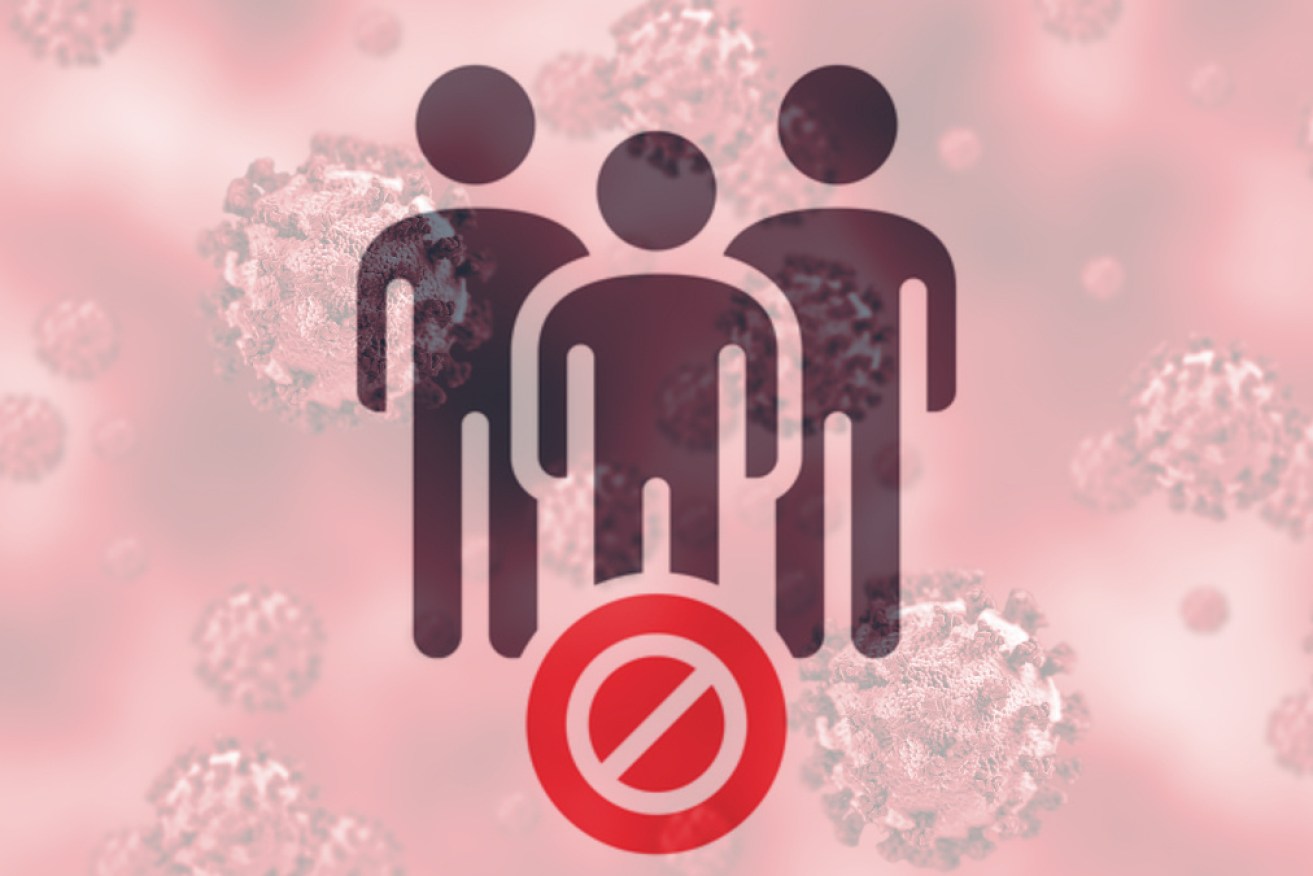New coronavirus rules: Morrison limits gatherings to two, urges elderly to stay home


Australians are being told not to group with more than one other person except if they're immediate family or from the same household. Photo: Getty
New rules will limit outdoor gatherings to just two people to stop the spread of COVID-19 while over 70s will be urged to remain inside “for their own protection” under the National Cabinet’s latest measures to combat the virus.
Prime Minister Scott Morrison announced the changes on Sunday night, confirming playgrounds, skate parks and outdoor gyms should be regarded as “closed for business” from midnight on Monday.
Mr Morrison stressed that parents can still take their kids outdoors for exercise but should not meet in groups with other families for catch-ups.
“The strong advice is don’t gather together in groups. That’s the simple way of putting it. Just don’t do it. It’s not helpful,” he said.
“It actually creates the risk. And when you’re going out for shopping, you should be going for just stuff you need and do it and get home. It’s not a time for browsing.
“You must stay at home except for the following reasons: (A), shopping for what you need, food and other essential supplies that enable you to remain at home and to do that shopping as infrequently as possible; (B), for medical care or compassionate needs; (C), to exercise in compliance with the public gathering rules that I’ve already outlined; and (D), for work and education if you cannot work or learn remotely,” he said.
Retailers including supermarkets, pharmacies, Kmart, Target and Bunnings will remain open for “essentials”.

Woolworths slashed store hours to focus on priority deliveries to the vulnerable. Photo: AAP
State and territory governments will, however, consider further restrictions in each jurisdiction to limit shopping to essential services.
Asked why you could visit shopping centres with potentially hundreds of people but only hold a gathering of no more than two people outside, Mr Morrison gave the example of his wife, Jenny, going to buy a jigsaw puzzle.
“What we’ve said today is you should be only going out to shop for things that you actually need and you should be doing it on an irregular basis,” he said.
“I’ll give you an example. Our kids are at home now, as are most kids, and Jenny went out yesterday and bought them a whole bunch of jigsaw puzzles. I can assure you over the next few months, we’re going to consider those jigsaw puzzles absolutely essential.
“It’s important that parents and families and households can get the things that they need to completely change the way they’re going to live for the next six months at least. And so what we’ve done is sought to be practical about these issues.
“I mean, people are buying sporting equipment at the moment, gym mats and things like that so they can exercise at home. These are things they’re going to need.”
The Prime Minister said the limits on how many people could attend weddings (5 people) and funerals (10 people) were unchanged.
Chief Medical Officer Brendan Murphy also revealed there were early signs that Australia was not going down the path of Italy or Spain and that the measures put in place were having an impact.
The 3987 confirmed cases are “much less than some people might have predicted some time ago without mitigation” he said.

Scott Morrison and Brendan Murphy updated the public on the latest coronavirus measures from Parliament House in Canberra. Photo: AAP
“We are not Italy, we are not the United States, we are not Spain,” Dr Murphy said.
“We have one of the highest rates of testing per head of population in the world and one of the lowest positive test rates so we think, unlike countries unfortunately like Italy, Iran and even the US, that when they detected significant outbreaks they probably had much, much larger outbreaks in the community that were undetected.”
The Prime Minister said the advice for over 70s to stay indoors was a guide and not an edict.
“There is strong advice – this is not a compulsion, this is strong advice – that people aged 70 and over should stay at home and self isolate for their own protection to the maximum extent practicable,” he said.
“This does not mean that they cannot go outside. They can go outside and be accompanied by a support person for the purposes of getting some fresh air, some recreation. But they should limit contact with others as much as possible. These arrangements should also apply to those with chronic illness over 60 and Indigenous persons over the age of 50.”
National Cabinet also agreed that states and territories will be moving to put a moratorium on evictions of small businesses as a result of financial distress.
“And so there will be a moratorium on evictions for the next six months under those rental arrangements,” he said.
“We’re asking businesses to adapt to what is not a usual set of circumstances. They must be sustainable because they will run for, we believe, at least six months and we want to be able to get everybody through. So we are seeking their support. We will have more to say about commercial tenancies in the days ahead.”
How the new rules will work

Australians will have to adapt to the new rules or they may face fines. Photo: Getty
Indoor and Outdoor Public gatherings
National Cabinet agreed to limit both indoor and outdoor gatherings to two persons only.
Exceptions to this limit include:
- People of the same household going out together.
- Funerals – a maximum of 10 people.
- Wedding – a maximum of 5 people.
- Family units.
Individual states and territories may choose to mandate and/or enforce this requirement.
Stay inside
National Cabinet’s strong guidance to all Australians is to stay home unless for:
Shopping for what you need – food and necessary supplies;
medical or health care needs, including compassionate requirements;
exercise in compliance with the public gathering requirements;
work and study if you can’t work or learn remotely.
National Cabinet agreed that playgrounds, skate parks and outside gyms in public places will be closed. Bootcamps will be reduced to two people, including the trainer.
These measures will be in place from midnight Monday.
Further measures likely
National Cabinet discussed further restrictions on activities and venues.
States and territories agreed they would implement further measures specific to their own region, including closing categories of venues, where medical advice supported this action.
These measures would be risk-based and targeted at non-essential activities.
Australians will still be able to access the goods and services needed to safely and sustainably live their lives.
Advice for seniors and chronically ill

Seniors are being strongly encouraged to stay indoors. Photo: Getty
All Australians respect and value the contribution that older Australians make to our community.
Coronavirus has more serious impacts on older Australians, those over 70 years of age and Australians with existing health conditions or comorbidities.
National Cabinet’s strong advice is for self-isolation at home to the maximum extent practicable for Australians:
- Over 70 years of age.
- Over 60 years of age who have existing health conditions or comorbidities.
- Indigenous Australians over the age of 50 who have existing health conditions or comorbidities.
- These groups should limit contact with others as much as possible when they travel outside.
Commercial rents and tenancies
National Cabinet agreed to a moratorium on evictions over the next six months for commercial and residential tenancies in financial distress who are unable to meet their commitments due to the impact of coronavirus.
Commercial tenants, landlords and financial institutions are encouraged to sit down together to find a way through to ensure that businesses can survive and be there on the other side. As part of this, National Cabinet agreed to a common set of principles, endorsed by Treasurers, to underpin and govern intervention to aid commercial tenancies as follows:
- A short term, temporary moratorium on eviction for non-payment of rent to be applied across commercial tenancies impacted by severe rental distress due to coronavirus.
- Tenants and landlords are encouraged to agree on rent relief or temporary amendments to the lease.
- The reduction or waiver of rental payment for a defined period for impacted tenants.
- The ability for tenants to terminate leases and/or seek mediation or conciliation on the grounds of financial distress.
- Commercial property owners should ensure that any benefits received in respect of their properties should also benefit their tenants in proportion to the economic impact caused by coronavirus.
- Landlords and tenants not significantly affected by coronavirus are expected to honour their lease and rental agreements.
- Cost-sharing or deferral of losses between landlords and tenants, with Commonwealth, state and territory governments, local government and financial institutions to consider mechanisms to provide assistance.
National Cabinet will meet again on Monday 30th March 2020.








